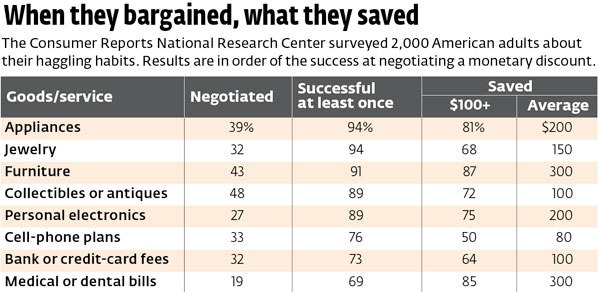8 Tips To Hone Your Haggling Skills
 We live in an age where a growing number of things are purchased online, and even those items bought at retail stores are often sold by large national chains that have little to no interest in customers who want to debate a product’s price. The art of haggling is in danger of becoming lost to future generations, but that need not be the case.
We live in an age where a growing number of things are purchased online, and even those items bought at retail stores are often sold by large national chains that have little to no interest in customers who want to debate a product’s price. The art of haggling is in danger of becoming lost to future generations, but that need not be the case.
True, you’re probably not going to be able to convince Amazon to give you a few bucks off a new video game, or get anyone at Walmart to listen to you when you say the store is charging too much for a laptop. But some chain stores, like Home Depot, do give staffers some latitude to bargain with customers, and there are plenty of other businesses out there that are willing to cut you a deal if you just try.
Our surveying siblings at Consumer Reports have just published their latest report on readers’ haggling habits and found that it’s definitely worth trying to talk your way into a discount whenever possible.
Readers had the highest success rate with appliance prices, which some retail stores will over-price knowing that bargain-hunters will try to haggle. 94% of those who asked for some sort of discount on their appliance purchases say they were successful, with the average haggler saving around $200.
Anyone who has ever looked at a simple wood bench and wondered why it costs $1,200 knows that furniture prices often seem arbitrary and exorbitant. Two virtually identical pieces of furniture can often be hundreds (if not thousands) of dollars apart in price. So it should be no surprise that 87% of haggling attempts were successful on furniture purchases and that people saved $300 on average.
Another area with big savings and a high rate of success was medical care. While only 19% of survey respondents said they tried to haggle on their medical or dental bills, 85% of them saved an average of $300.
Which leads us to the first of 8 haggling tips we’ve culled from CR’s list of 13:
1. Don’t be intimidated by a title. Consumers are often reluctant to haggle with doctors or lawyers because they have many fancy degrees hanging on their walls and several letters after their names. But the fact is that most doctors, lawyers, dentists and other professionals will negotiate a lower price if you ask.
2. Give sellers a reason to negotiate. If there’s a long-term financial benefit to the seller to give you a deal, then point it out. For instance, if knocking down the price of a car will have you servicing the vehicle at the dealership, then say so. Try to convince the seller that this is the beginning of a longer financial relationship and not just someone out to score a one-off bargain.
3. Be willing to walk away. Don’t just threaten to go somewhere else with your money; be prepared to actually do so. So when you call up your wireless company to ask for a better deal on your new contract, know exactly what the competitor can offer you and be prepared to accept that if your current provider can’t make you a matching — or better — offer. In general, trained sales people can tell when a customer is just pretending to walk out the door and go elsewhere.
4. See whether the seller is anxious. Try to read the seller for signs of eagerness to close a deal. This is especially true in the real estate market, where there are plenty of sellers who are hemorrhaging money every month by holding on to a property they can’t afford. See how long a house has been on the market and if the price has dropped. Test the seller’s response to your indecisiveness. You may be able to score a huge discount by agreeing to make a deal sooner rather than later.
5. Decide on a fair price. Do your research in advance, and use it to make your case for the price you believe is fair. Also consider other factors beyond the sticker price into your total cost — some sellers will not budge on a sticker price, but they will deliver the product for free.
6. Stay mum. Talking too much can be to your detriment, while remaining quiet can reap benefits. “They’ll wonder if they’ve offended you,” says Steven Cohen, president of Negotiation Skills, which teaches corporate clients how to sharpen their bargaining techniques. “They’ll think, ‘Maybe what I said didn’t sound appealing,’ and they may repackage the offer into a more attractive one.”
7. Find flaws. Why should you pay full price for a flawed product, even if the flaw is incredibly minor and one you’d be willing to accept? If you notice the flaw, so will other potential buyers, so why not point it out and get a discount by taking the imperfect product off the seller’s hands?
8. Seek a discount for cash. Credit card transaction fees can take a bite out of a seller’s bottom line, so some are more than willing to give you a deal if you pay cash. Of course, you may be giving up some of the purchase protections offered by credit cards.
Check out the whole haggling story on the Consumer Reports website.
Want more consumer news? Visit our parent organization, Consumer Reports, for the latest on scams, recalls, and other consumer issues.

